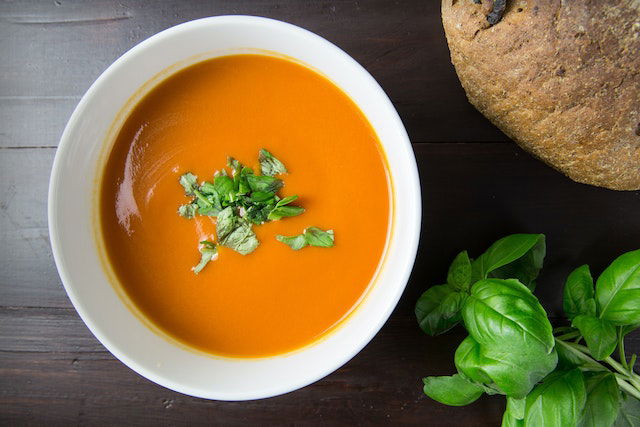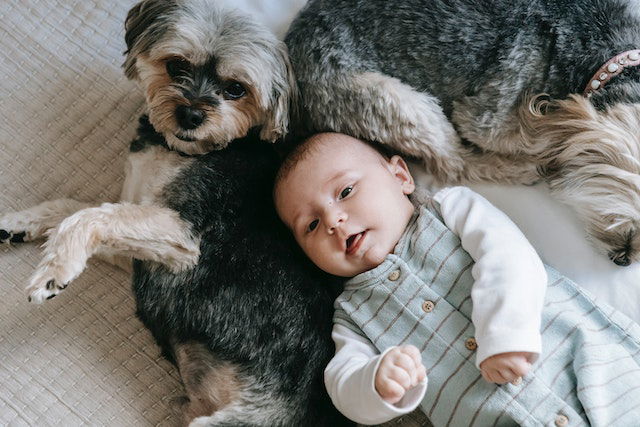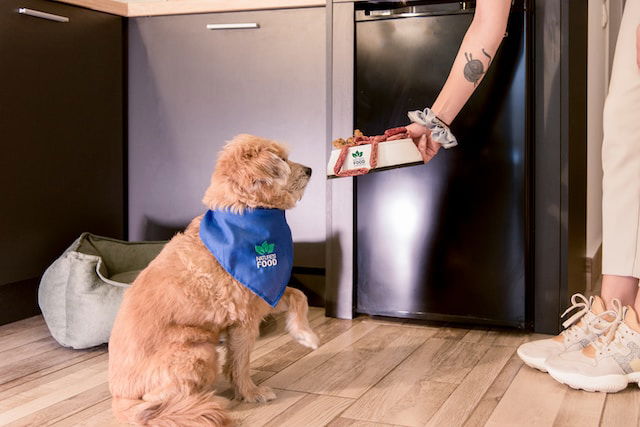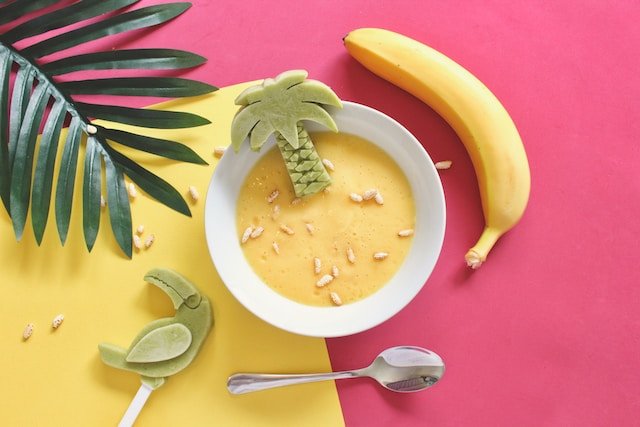We're an affiliate
We hope you love the products we recommend! Just so you know, we may collect a share of sales or other compensation from the links on this page at no additional cost to you. Thank you if you use our links, we really appreciate it!
Transitioning your baby into solid food can be challenging, especially since they can create a messy situation on the floor, enticing the dog to clean it up.
The good news is that baby food is safe for dogs, but there is a caveat – you should give it in moderation and it should not have any toxic ingredients for dogs.
Most baby foods, especially meat-based, are infused with a strong scent that attracts your dog to sniff or take a bite.
In this article, we will explore the safety concerns of feeding your dog food for human babies and provide the risks and benefits of such a diet.
What Is Baby Food?
Baby food, also known as infant food, is pureed soft food that can easily be consumed by babies of between 6 months to 2 years old.
There are many forms of foods for babies, but the main ones are pureed fruits (bananas, apples), semi-solid vegetables (such as peas), and grounded meat-based foods (turkey, chicken, beef).
Most baby-specific foods are typically made with minimal seasoning to maintain the natural taste and nutrients and for easier digestion.
The nutritional profile of food for human babies may vary depending on the source ingredient. Most of them are however made with the necessary nutrients to support the infants’ growth and development.
Some of the major nutrients found in baby-specific foods include proteins, vitamins, carbohydrates, and trace minerals.
Can Dogs Eat Baby Food?
Dogs can sparingly have baby food as an occasional treat and not as a staple diet. You should not give excess infant food to your dog since it may problems with the digestive tract.
Sometimes your dog may refuse to take their regular meals due to an underlying stomach condition or when they’re emotionally disturbed.
In such situations, you may be required to look for safe alternatives to keep your dog energized as you seek medication.

Dr. Susan Freer from the Cummings Veterinary Hospital says that giving dog-safe baby food to your pooch can be a temporary solution when nothing else seems to work for them.
Excessive consumption of certain baby foods may predispose your dog to add too much weight leading to obesity. This is due to the highly packed calorie content in such foods.
Baby food should never be a replacement for your dog’s high-quality balanced diet, because they don’t have the right nutritional profile to support your pup in the long term.
Monitor your dog after eating baby food
As with all other new foods, you should monitor your dog after feeding them food for human babies.
Even though it is highly unlikely for your dog to react negatively, it is always a good idea to watch out for symptoms such as upset tummy, diarrhea, or allergic reactions.
Leftover baby food should be refrigerated and consumed within the next 24 to 48 hours.
Why Is Baby Food Good for Dogs?
1. An alternative for sick dogs
Dogs who refuse to take their regular meals, due to an illness, may be given baby food to soothe the stomach.
Pet parents can use small amounts of infant food to give medication to their sick dogs for easy uptake.
Meat-based baby nourishments can be used to cover the bitter taste of certain prescription pills and this will help in administering timely medication to your pup.
Baby food can be a valuable treat option for your dog to help them gain enough energy for recovery. But before feeding baby food to your dog, we strongly suggest that you get advice from your vet.
Your vet will weigh your dog’s health concerns and allergies against the prescribed baby food and offer a professional opinion.
2. Baby food is easy to digest
Baby foods are formulated with limited ingredients and most of them are unseasoned. This makes them easy on your dog’s stomach, especially for those suffering from digestive issues.
3. Increases bonding with the kids
When your baby interacts with the dog by sharing a meal, it helps in creating and promoting a long-lasting friendship.
The dog may also clean after a messy floor or lick the baby’s face smeared with semi-liquid food and this action promotes bonding.

Nearly all dogs are motivated by food, and when it comes from the little ones, the dog will create a positive association and bond with the toddler.
You should always be careful not to let the two have too much of each other. If the dog develops food aggression, they may end up stealing the baby’s food and this will create strife.
4. It is Sweet
Most baby foods are sweet and delicious for dogs, and they come in a variety of flavors. With the endless variety to choose from, you can be sure to find something that Fido cannot resist.
You can also mix wet baby food with a few dog treats for enrichment and to provide your dog with a whole new flavor.
Safe Baby Food Options for Dogs
As you may already know, there are lots of jarred baby food in the market from various manufacturers.
But if you’re planning to feed it to your dog, we suggest that you look for foods with high-quality ingredients and beneficial nutrients.
If you’re watching your dog’s weight, then we suggest going for protein-based foods as opposed to those with carbohydrates.
The following are a few examples of the dog-safe baby foods you can find in the market today:
Baby Food Ingredients to Avoid for Dogs
One of the greatest risks of feeding baby food to your dog is encountering ingredients that are toxic to dogs.
You should always research the baby food type you are aiming to buy and note down all the ingredients used, before feeding them to your furry friend.
Some baby foods are formulated with toxic ingredients for dogs such as onions, garlic, and other spices. Grapes, avocados, and some types of citrus fruits are also toxic to dogs.
Dogs who accidentally ingest toxic ingredients may show signs of upset stomach such as vomiting, tummy pains, and diarrhea within the first three days.
Excessive consumption of toxic foods may cause your dog to be lethargic, have pale gums, decreased appetite, and kidney failure.
If you suspect that your dog has eaten baby food with toxic ingredients, you should induce vomiting and make a quick trip to your vet.
Homemade Baby Food Recipes for Dogs
There are various formulations and brands of store-bought baby foods and you cannot miss an option that works well for your pup.
However, you can also get creative at home and formulate your homemade baby food to feed your little ones and the dogs too.

The main benefit of preparing your baby food at home is that you have total control over what your dog consumes.
By doing it yourself, you can choose the fresh ingredients and process them plainly without adding spices, salt, and sweeteners.
2 DIY Baby Food Recipes for Your Dog
1. Pumpkin puree treat (one ingredient)
Ingredients
- ¼ medium sized Pumpkin
- 3 cups of clean water
Instructions
- Wash the pumpkin with clean running water, then remove the skin and seeds.
- Chop it down into sizeable cubes.
- Boil the chopped pumpkin pieces for about 20 minutes.
- Drain the excess water using a strainer funnel.
- Process the cooked pumpkin using a blender to form a smooth puree
- Adjust the thickness by adding water.
- Serve it to your dog as a standalone treat or mix it with dog food.
The remainder can be stored in a sealed jar container and put in the fridge to last for about one week.
You can also freeze the puree in an ice cube tray to serve your dog frozen treats during the summer. Frozen pumpkin puree can last for six months.
2. Sweet potatoes and chicken treat
Ingredients
- 1 Skinless chicken breast (boneless)
- ½ cup chicken broth
- 1 medium-sized sweet potatoes
- 1 tablespoon coconut oil
- 1 egg
Process
- Wash the chicken breast thoroughly and chop it into sizeable chunks
- Cook the chicken breast chunks with coconut oil for about 30 minutes.
- Bake the sweet potato in an oven until it gets soft for about 30 minutes at 350°F.
- Remove the baked sweet potato skin and mash it.
- Mix the mashed sweet potato, cooked chicken, beaten egg, and chicken broth in a bowl until it forms a dough.
- Use a rolling pin to flatten the dough on a flat surface.
- Bake the mixture in an oven at 350°F for about 20 minutes until the color changes to golden brown.
- Let it cool and cut out a small piece to snack your pooch.
Transitioning From Baby Food to Regular Dog Food
If your dog was sick and couldn’t eat their regular canine-specific foods, you may have fed him some small amounts of baby food as advised by the vet.
But when the dog recovers, you need to slowly transition them back to eating their regular foods as soon as possible.
You don’t want a situation where your lovely pup gets so used to human-specific meals for their daily food needs.
Transiting your dog back to their regular diet after recovery will help in preventing digestive issues such as tummy upsets.
Slow transitions allow your dog’s body to fully recover and adapt to their regular diet without upsetting the GI tract.
How to transition from baby food to regular dog food
Start by mixing equal portions of baby food with your dog’s regular food in a bowl and offer them to eat at mealtime.
If your dog shows little interest in the food, you may adjust the ratio to 70% baby food and 30% dog food.
Once your dog enjoys the new mixture, you can slowly increase the dog food content and reduce the baby food with each meal session.

Do this until your dog eats a full canine-specific meal without compromise and while observing for unwanted symptoms such as tummy aches.
Feel free to consult your vet nutritionist for professional advice on how to go about the transition when you encounter challenges.
Frequently Asked Questions (FAQs)
1. Can dogs eat all types of baby food?
No! Some baby food types are safe for dogs while others are made with ingredients that may be toxic to dogs.
In most cases, it helps to stick to unseasoned meat-based baby food and check on the ingredient label for any spices such as garlic.
2. Is it safe to feed baby food to puppies?
Yes! Puppies too can enjoy unsweetened mushy foods for human babies as long as it is toxic-free, and given in moderation as an occasional treat.
Make sure your puppy has been weaned from their mother before introducing them to solid puppy foods. Most puppies may need between 8 to 10 weeks to get weaned into solid foods.
3. How much baby food can I give my dog?
Moderation is key. Dogs should consume baby food as treats, meaning it should not form more than 10% of the main diet.
One or two tablespoons of pureed baby food are enough to entice your dog’s taste buds and improve their appetite.
4. Are there any specific baby food brands recommended for dogs?
No! There are hundreds of store-bought baby food brands in the market and online stores. There’s no specific brand that we can say is better for dogs than the rest, or worse.
We encourage pet parents to focus on the individual ingredients of their chosen brand and deduce the potential benefits and side effects of each one of them.
To be on the safer side, you should consider going for certified brands that make plain, unsweetened baby foods with single ingredients that are beneficial for dogs.
Conclusion
Can dogs eat baby food? The short answer is yes. There’s no harm in giving your furry friend a tablespoon or two of bland foods for human babies as an occasional treat.
Canine-specific whole foods should always form the better part of your dog’s main meals. Baby food can work to entice your dog’s appetite when they need something different for their taste buds.
You should however not rely on foods for babies as the main source for your dog’s nutritional needs.
Scrutinize the ingredients label of your preferred baby food brand before feeding it to your dog. Your vet is better placed to offer you expert advice on how and when to feed your dog human foods.
Laura is the founder of Furs'n'Paws. She is a also a pet writer and expert with more than 20 years of experience of working with dogs and cats. She developed a very strong love for animals at a young age. Her passion led her to establish a thriving pet sitting and dog walking business in Dubai. As an expert in pet training, behavior, and nutrition, Laura is committed to helping pet owners and pet lovers by offering high-quality information on a wide range of topics.



No responses yet